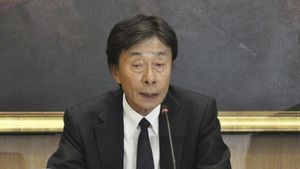Former President Jimmy Carter, who passed away at the age of 100, left behind not only policies and political debates but also cherished friendships with cultural icons like country music legend Willie Nelson. Known as the 'Rock 'n' Roll President,' Carter had the unique ability to connect with musicians, bridging gaps between politics and art during his presidency from 1977 to 1981. Among the many artists he associated with, none perhaps are as memorable as Nelson, whose presence and music influenced Carter's life both personally and politically.
The bond between Carter and Nelson was not just about music; it reflected their shared values of peace, humility, and authenticity. Nelson's famous anecdote about smoking marijuana on the roof of the White House epitomizes their unconventional friendship. "Sitting on the roof of the White House... with a beer in one hand and a fat Austin Torpedo in the other, I driftedinto a reflective mood," Nelson wrote. This moment, which captured the essence of relaxed camaraderie between them, was punctuated by the fact they were not alone; Nelson was with Jimmy Carter's son, Chip, who was reportedly there during the infamous event.
During this unique occasion, Nelson had just performed for Carter at the Rose Garden, and the two shared laughter and stories, reflecting on their journeys and the power of music to shape society. Carter himself was known to listen to Nelson's music as he grappled with the pressures of the presidency, stating, "I would play Willie Nelson music primarily... so I could think about my problems and say a few prayers." Through music, Carter found solace and strength, turning to it as a therapeutic outlet during turbulent times.
The affinity between country music and Carter's presidency was also laid bare when examining how he embraced various genres and musicians, establishing relationships not only with Nelson but also with other local legends like Johnny Cash and the Allman Brothers. Their political endorsements throughout his campaign helped strengthen Carter's footing among the youth and brought attention to his presidency during divisive times.
Carter's passion for music was rooted deep within his upbringing. Growing up surrounded by gospel music from Black tenant farmers on his family's land instilled within him the power of music as more than mere entertainment. For Carter, music was influential – it served as both comfort and inspiration. His discussions with unconventional thinkers like Bob Dylan demonstrated how music informed his perspectives on justice and social issues, marking him as both reflective and relatable.
Both men faced scrutiny within their respective fields, yet they transcended their roles through their genuine commitment to leadership devoid of pretense. Carter was determined to stay true to his roots as he entered the national political stage, emphasizing honesty and authenticity. Nelson, for his part, consistently challenged conventional views on marijuana and advocated for its medicinal properties, all the same valuing personal responsibility and moderation.
"I think marijuana should be recognized for what it is, as a medicine,an herb... If you need it, use it," Nelson stated, showcasing his ability to address contentious topics directly and candidly. This honest approach aligned with Carter's essence—a man striving for goodwill and seeking to uplift those around him. Nelson praised Carter’s demeanor, expressing, "Jimmy Carter and Rosalynn are like people I grew up with... They’re so down-to-earth and so nice they were too good to be politicians."
Their relationship only deepened over the years, with Nelson frequently staying connected to Carter after his presidency through various humanitarian efforts, especially Habitat for Humanity. This connection proved monumental as both men sought to engage with societal issues beyond the political sphere, demonstrating their shared commitment to service and compassion.
Reflecting on their legacies, both Carter and Nelson emphasized the importance of being genuine leaders for the people rather than merely performing political roles. Their interactions serve as reminders of the power inherent within both music and friendship to bridge divides, heal communities, and advocate for peace. Their stories have shaped cultural narratives and will continue to resonate with future generations seeking role models who prioritize authenticity and collaboration over rivalry.
Willie Nelson's accounts of their friendship provide insightful glimpses of not just two icons from different fields, but also of two men who represented more than political and musical labels. Their genuine respect for each other and similar ideas about living authentically played significant roles throughout their lives, ensuring they will be remembered not just for their labels but their substantial impacts on society.



